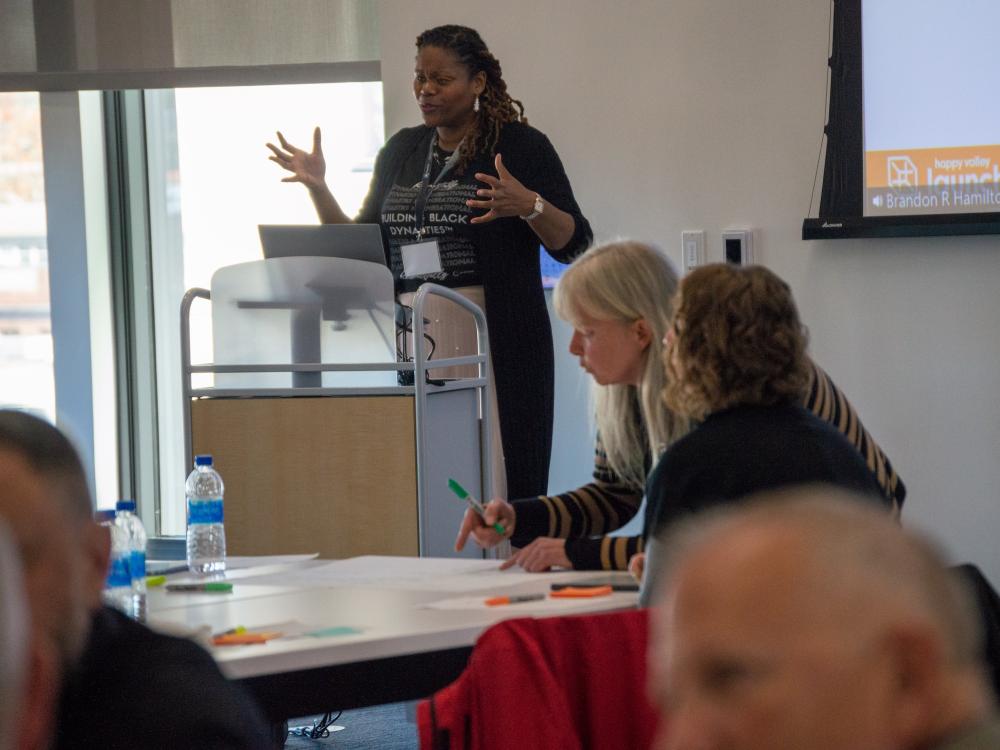
he 2022 Penn State Entrepreneurship Educators Conference on Nov. 4 brought together 75 faculty, staff and other collaborators at the recently opened Eric J. Barron Innovation Hub in State College.
The annual conference, now in its 10th year, is organized by the Center for Penn State Student Entrepreneurship, a collaborative effort by educators from many colleges, campuses and programs at Penn State who are focused on entrepreneurship from an academic perspective.
Over the course of five sessions, educators, faculty and staff involved in entrepreneurship efforts at Penn State discussed participation data, racial equity in entrepreneurship, social entrepreneurship, student engagement and recruiting and explorations of innovation competitions and programs.
Wicked problems
LaTanya White is the founder and CEO of Concept Creative Group, a technical assistance firm focused on business development and capacity building for Black entrepreneurs. White also created the trademarked Dynastic Wealth, which expands upon the ideas of transferring wealth to future generations beyond just financial wealth.
White explored some of the socially pervasive, systemically apparent societal problems, also known as “wicked problems,” which are complicated to solve and don’t have a single answer.
First-generation students and those from underrepresented groups have a harder time accessing entrepreneurship programs at colleges at universities, she said. Even when these students arrive on campus, they are often at a disadvantage when trying to navigate large institutions and their programs.
White also explained how racist treatment of Black people in the past have effects on today’s Black entrepreneurs. For those starting a business, there is an expectation of a “friends and family” round of raising capital. From property confiscation to denial of credit for their ancestors, Black entrepreneurs suffer a disadvantage during fundraising.
Social entrepreneurship
During a panel with three entrepreneurship educators, participants grappled with questions of how entrepreneurship can be used to further humanitarian goals and advocacy, known as social entrepreneurship.
The conversation turned to the identity of entrepreneurs, with some conference attendees voicing the opinion that many current college students shun the word “entrepreneur” because of its recent negative representations in the media and sullying by some powerful company founders. Part of countering that stereotype, said John Gershenson, director of Humanitarian Engineering and Social Entrepreneurship in the College of Engineering, was to push back against the idea that a company or entrepreneur has to dominate their industry.
“There is not only one way to win,” Gershenson said he tells his students. “You don’t have to be the biggest and the best.”
Panelists also discussed the triple bottom line, which in addition to “profit” considers “planet and people.” Travis Lesser, instructor in the Smeal College of Business, said he tells his students that in order to use capitalism to make positive change, companies still have to make a profit.
“You need to be generating enough money to have the impact you want to have,” Lesser said.
Engaging students
It was hard to bring students back into the classroom during the COVID pandemic, said Mark Gagnon, Harbaugh Entrepreneur and Innovation Faculty Scholar and associate teaching professor of agribusiness in the College of Agricultural Sciences.
The afternoon panel on student engagement and recruiting saw conversations on how entrepreneurship educators could connect with students, especially those who endured a chaotic 2020 and 2021.
Bob Beaury, instructor of entrepreneurship and leadership in the College of Engineering, said educators have to provide relevant content to students. To do that, educators must build relationships, get to know their students and find out where they get their information. He pointed out that many entrepreneurship students don’t have a clear idea of what they want to do after college, and many will end up matriculating into companies and not founding a startup.
Donna Bon, associate teaching professor of entrepreneurship at Penn State Altoona, said that she asks her students what they want to talk about. At Penn State Altoona, she said relationships and experiential opportunities were key to approaching and retaining students.
In addition to developing relationships Gagnon suggested instructors can develop more interactive content and share personal and professional experiences.
Inclusive innovation and competition programs
Penn State Berks’ Sadan Kulturel-Konak, professor of management information systems and director of the Flemming Creativity, Entrepreneurship and Economic Development Center, and Abdullah Konak, distinguished professor of information sciences and technology, presented their ongoing research funded by Penn State Social Science Research Institute and the National Science Foundation on innovation and competition programs, such as pitch competitions.
The two presented their surveys on what students think about innovation and competition programs, the perceived benefits and costs of participation, and how students decide whether to participate in them. They found that awareness, cost, and time commitments were reported issues for many students. They also discussed how engaging academic advisers was crucial for making sure students were aware of competition opportunities. Conference attendees then participated in a collaboration exercise to explore and share best practices and challenges for competitions in a group activity.
About the Center for Penn State Student Entrepreneurship
The CPSSE has affiliated programs from across the University.
-
The bachelor of science in business with entrepreneurship option and entrepreneurship minor and the Sheetz Fellows program and Sheetz Center for Entrepreneurial Excellence at Penn State Altoona.
-
The Intercollege Entrepreneurship and Innovation Minor.
-
The Corporate Innovation and Entrepreneurship major and graduate credit certificate program from the Smeal College of Business.
-
New Ventures and Entrepreneurship graduate certificate from Penn State Great Valley.
-
Entrepreneurship minor, master's of business administration and CIENT graduate certificate program from Penn State World Campus.
-
Graham Fellows Program for Entrepreneurial Leadership from Penn State York.
-
Several student organizations with an entrepreneurship and innovation focus, including Innoblue, Happy Valley Communications, Enactus, HackPSU and Happy Valley Venture Capital.
Learn more about entrepreneurship and innovation at Penn State at cpsse.psu.edu. CPSSE and the Entrepreneurship and Innovation Minor are supported by Penn State Undergraduate Education.